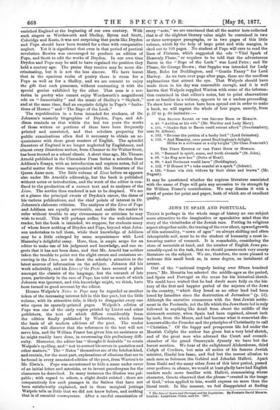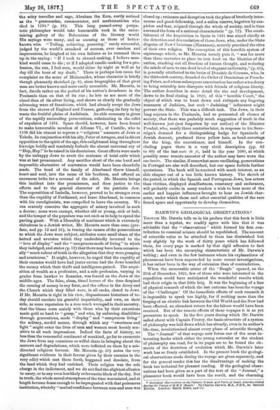JEWS IN SPAIN AND PORTUGAL.
THERE is perhaps in the whole range of history no one subject more attractive to the imaginative or speculative mind than the story of the vicissitudes of the Jewish race. Putting its religious aspect altogether aside, the tracing of the ever silent, upward growth. of this nationality, "sown of ages" on always shifting and often
inhospitable soil, must be to the student of humanity a most in- teresting matter of research. It is remarkable, considering the store of materials at hand, and the number of English Jews pre- sumably equal to the task, that we should possess such very scanty literature on the subject. We are, therefore, the more pleased to welcome this small book as, in some degree, an instalment of arrears.
Out of the "national tragedy lasting over fifteen hundred years," Mr. Mocatta has selected the middle-ages as the period, and Spain and Portugal as the scene for his historical sketch.
We could have wished that he had dwelt more fully on the his- tory of the first and happier period of the sojourn of the Jews
in the country, "which they loved as no other land had been loved by Israelites since the destruction of Jerusalem" (p. 51). Although the narrative commences with the first Jewish settle- ment in the Peninsula, yet the life which the Jews there led is only followed in anything like detail from about the middle of the
thirteenth century, when Spain had been regained, almost inch by inch, from the Moors, and had become what it somewhat dis- honours alike the Founder and the principles of Christianity to call "Christian." Of the happy and prosperous life led under the Moorish Caliphs the author has given but a very brief sketch, and of the great men who adorned the Court and council- chamber of the grand Ommeyade dynasty we have but the barest mention. We hear of the enlightened Abderahman, third Caliph of Cordova, but miss all notice of his famous Jewish minister, Hasdai ben Isaac, and find but the merest allusion to such men as Solomon ibn Gebirol and Jehudah Hallevi. Apart from Bashi and the many other Jews of this later period, passed over perforce in silence, we would at least gladly have had English readers made more familiar with Hallevi, summarising whose character, Graetz observed that the phrase "created in the image of God," when applied to him, would express no more than the literal truth. In like manner, we feel disappointed at finding
• 27,e Jews of Spain and Portugal and the Inquisition. By Frederic David /Watts. London : Longmans, Green, and Co. 1877.
the witty traveller and sage, Abraham ibn Ezra, curtly noticed as the "grammarian, commentator, and mathematician who
died in 1194." (p. 18). This long passed-away peripa- tetic philosopher would take honourable rank in the enter- taining gallery of the Bohemians of the literary world. His sayings were many, and as amusing as those of better- known wits. "Toiling, achieving, pursuing," rarely successful, judged by the world's standard of success, ever careless and impecunious, he laughed at his own failures as he summed them lap in the saying "If I took to shroud-making, I believe man- 'kind would cease to die ; or if I adopted candle-making for a pro- fession, the sun, I feel sure, would shine by night as well as by day till the hour of my death." There is perhaps leas cause for complaint on the score of Maimonides, whose character is briefly though pleasantly sketched (p. 8), since biographies of that great man are better known and more easily accessible. Mr. Mocatta, in fact, dwells rather on the period of his nation's decadence in the Peninsula than on that of its rise ; he lets us see more of the cloud than of its silver lining, and shows us clearly the gradually advancing wave of fanaticism, which had already swept the Jews from the shores of England and France, gathering its fury to lay waste the fruitful plains of Andalusia. An able summary is given of the rapidly succeeding persecutions, culminating in the edict of expulsion of 1191. Space should, however, have been found to make honourable mention of Alfonso VI., of Castile, who in 1108 did his utmost to repress a " religious " massacre of Jews at Toledo. In conjunction with his ally, Peter of Arragon, and in direct opposition to the spirit of the age, this enlightened king throughout his reign boldly and resolutely forbade the almost universal cry of 4' Hep, Hep !" to be raised in his dominions. Great efforts were made by the unhappy Jews to avert the sentence of total exile which was at last pronounced. Any sacrifice short of the one hard and impossible alternative of conversion would have been cheerfully made. The head of the family of Abarbanel threw himself, heart and soul, into the cause of his brethren, and offered an enormous bribe for a reversal of the edict. Mr. Mocatta brings this incident into due prominence, and does justice to the efforts and to the general character of the patriotic Jew. The superstition of Isabella, however, proved to be stronger even than the cupidity of Ferdinand, and Isaac Abarbanel, in common with his coreligionists, was compelled to leave the country. We can scarcely conceive the aggregate of misery involved in such a decree ; none were exempt, whether old or young, sick or halt, and the temper of the populace was not such as to help to speed the parting guest. With a liberality of sentiment which is extremely chivalrous in a Jewish writer, Mr. Mocatta more than once (pre- face, and pp. 12 and 24), in tracing the causes of the persecutions to which the Jews were subject, attibutes some small share of the hatred and aversion which they undoubtedly incurred to the -" love of display" and the "sumptuous mode of living" in which they indulged, and states (p. 12) that there may have been occasion- ally "much colour of truth in the allegation that they were grasping and avaricious." It might, however, be urged that the cupidity of their enemies would have had juster excuse had the Jews hoarded the money which their thrift and intelligence gained. The acqui- sition of wealth as a profession, and a sole profession, varying in grades from hawker to financier, was forced on the Jews of the middle-ages. The false, sham, tinsel heroes of the time despised the earning of money in any form, and the offices in the Army and the Church which they filled were, in all ranks, closed to Jews. If Mr. Mocatta is right in his view, dispassionate historians of to- day should emulate his graceful impartiality, and own, on their side, as some reparation to a race much wronged in their ancestry, that the blame rests mainly with those who by their extortions made gold so hard to "grasp," and who, by enforcing disabilities through generations, made " display " and "sumptuous living" the solitary, sordid means, through which any "sweetness and tight" might enter the lives of men and women most keenly sen- sitive to all such impressions. Indeed the facts of history, no leas than the remorseful sentiment of mankind, go far to exonerate the Jews from any conscious or wilful share in bringing about the sorrows and degradations, which were inflicted on them by a mis- directed religious fervour. Mr. Mocatta (p. 50) notes the very significant evidence in their favour given by their enemies in the very edict which cast them forth, beggared and desolate, from the land which they had enriched. Their religion was the sole charge in the indictment, and we do not find the slightest allusion to usury, or to any even less likely or favourite libels of the day. But in truth, the whole moral atmosphere of the time was tainted, and at length became dense enough to be impregnated with that poisonous institution, whereby "mutual confidence between man and man was closed up ; reticence and deception took the place of brotherly inter- course and good-fellowship, and a sullen reserve, begotten by sus- picion and fear, reigned through the whole of society, and in time assumed the form of a national characteristic" (p. 72). The estab- lishment of the Inquisition in Spain in 1481 was aimed chiefly at the detection and denunciation of those Jews, who, under the State disguise of New Christians (Marannos), secretly practised the rites of their own religion. The conception of this horrible system of espionnage which, as Mr. Mocatta tersely puts it, "was for more than three centuries to place its iron hoof on the liberties of the nation, crushing out all freedom of human thought, and reducing the minds of men to one dead level of stagnant uniformity," (p.45), is generally attributed to the brain of Dominic de Guzman, who, in the thirteenth century, founded the Oilder of Dominican or Preach- ing Friars, and whose subsequent canonisation has rather a tendency to bring saintship into disrepute with friends of religious liberty. The author describes in some detail the rise and development, down to its final closing in 1820, of this "horrible Court," the object of which was to hunt down and extirpate any lingering remnants of Judaism, lest such " Judaiaing " influences might pervert the State. This was a difficult task. The Jews, in their long sojourn in the Peninsula, had so permeated all classes of society, that there was probably much suggestion of truth in the well-known jest (not forgotten by our author) of the Minister Pombal, who, nearly three centuries later, in response to his Sove- reign's demand for a distinguishing badge for Spaniards of Jewish descent, produced three yellow hats, as head-coverings for the king, the executioner, and himself. In the con- cluding pages there is a very vivid description (pp. 82 to 88) of the last auto de fe, held in the year 1680, at which possibly some remote ancestor of the author may have worn the ran benito. The similar, if somewhat more vacillating, persecutions in Portugal are also well described, but our space forbids further quotations. The book will be received with much interest, as an able chapter out of a too little known history. The sketch of the period, in which the Spanish and Portuguese Jews, less actors than victims, displayed steadfastness, constancy and endurance, will probably excite in many readers a wish to hear more of the earlier and happier influences brought to bear on Jewish char- acter, under which these and other essential qualities of the race found space and opportunity to develop themselves.



































 Previous page
Previous page